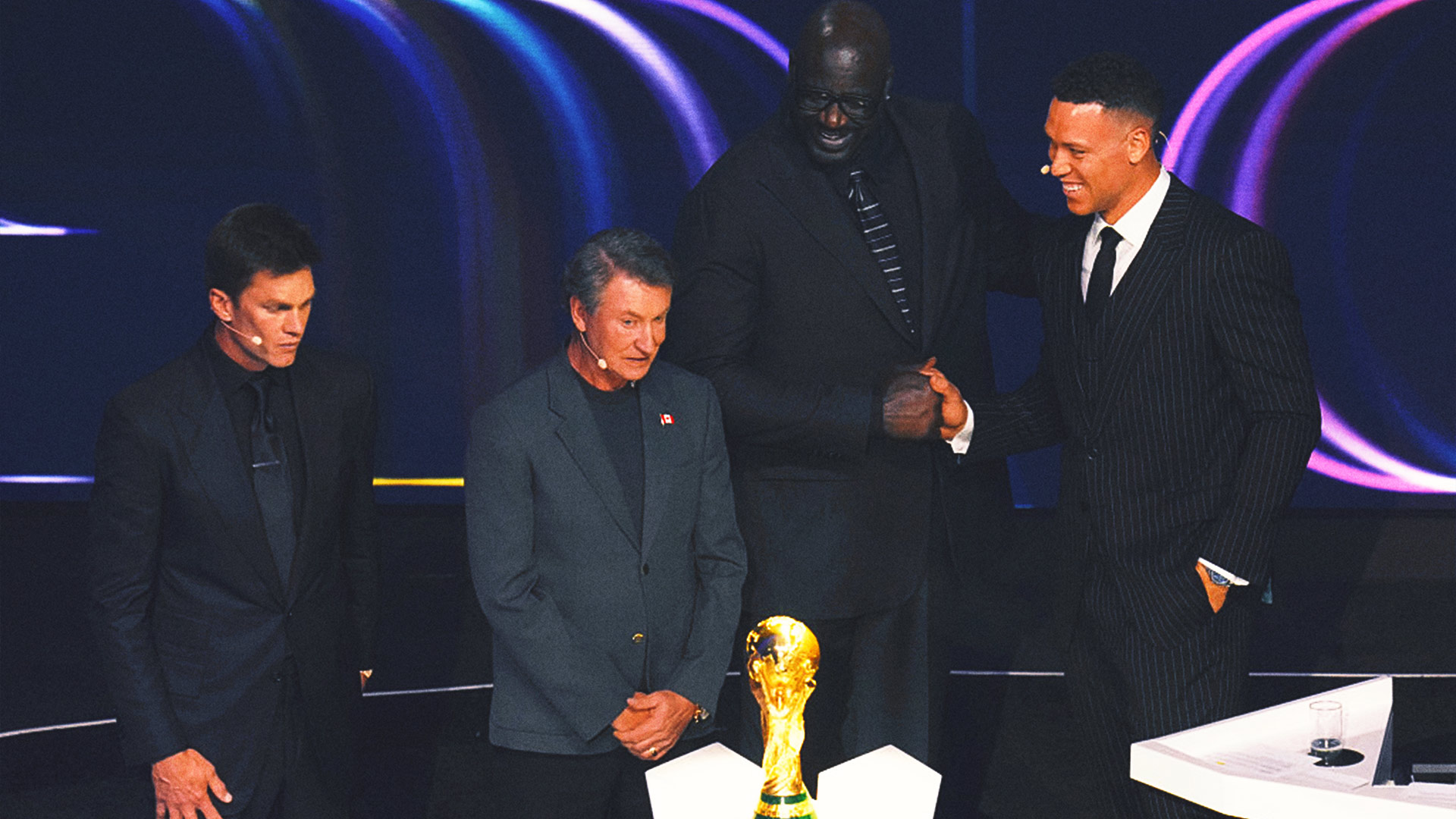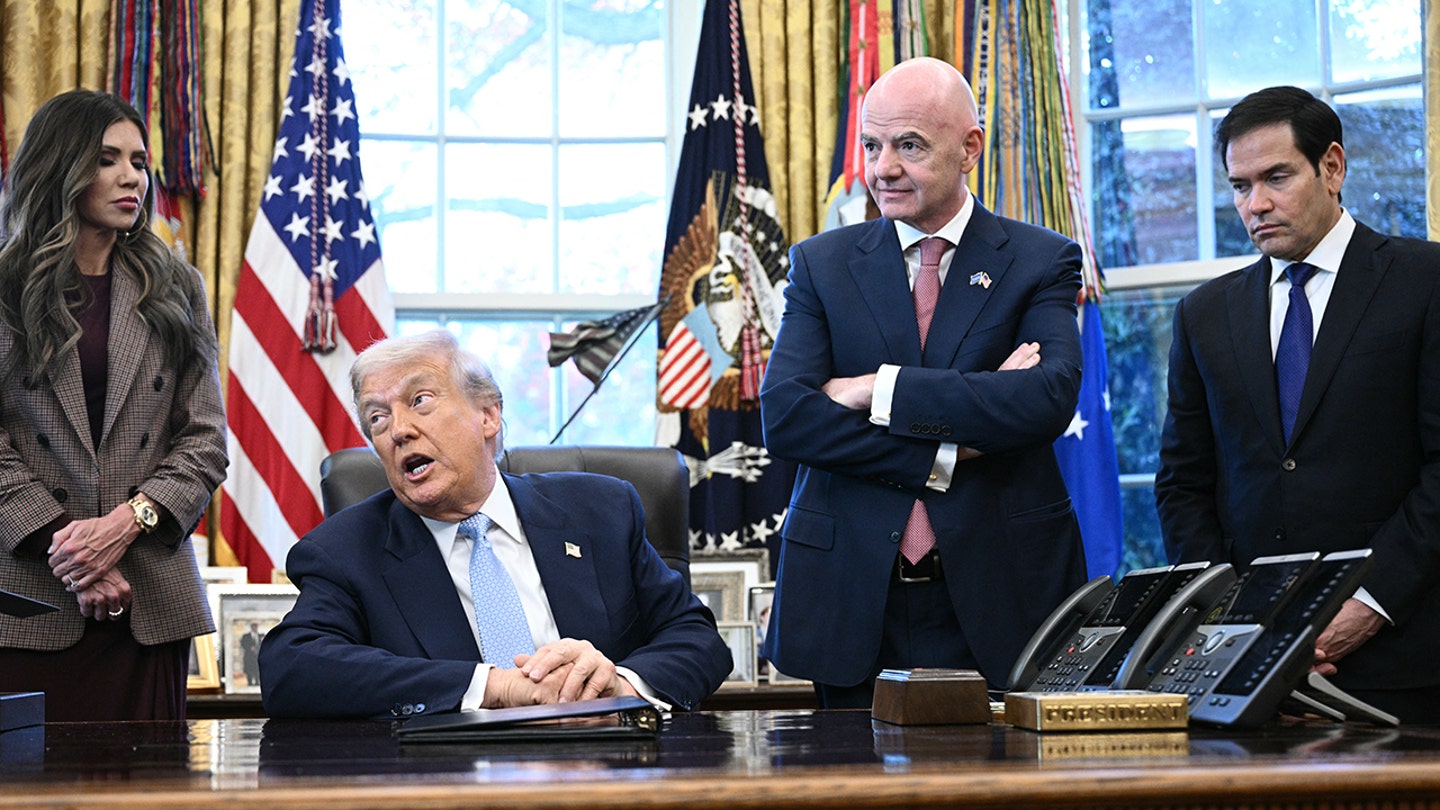
NBA heckler yells 'leave Greenland alone' during US national anthem at London game
Entities mentioned:
- United States: Power, Control, Security
- NBA Heckler: Moral outrage, Justice, Righteousness
- President Donald Trump: Ambition, Power, Control
- Denmark: Self-preservation, Security, Wariness
- NATO allies: Unity, Security, Wariness
Article Assessment:
Credibility Score: 70/100
Bias Rating: 55/100 (Center)
Sentiment Score: 30/100
Authoritarianism Risk: 65/100 (Authoritarian Tendencies)
Bias Analysis:
The article presents multiple viewpoints, including criticism of the US stance. However, it leans slightly towards emphasizing US actions and reactions, giving more context to the US position.
Key metric: International Relations Score
Let me tell you something, folks - this is a GAME-CHANGING play in the international arena! The United States is coming out swinging, trying to make a power move on Greenland like it's the fourth quarter and they're down by 20! But hold on to your hats, because we've got a surprise player off the bench - an NBA heckler stepping up to the plate and calling out this aggressive strategy! It's like watching a rookie challenge the star player, and let me tell you, the crowd is eating it up! President Trump is playing hardball, threatening tariffs like he's throwing fastballs, but Denmark and the NATO allies are bringing their A-game defense. This is turning into a full-court press situation, with European countries rushing to guard Greenland like it's the final seconds of a championship game. The tension is so thick you could cut it with a hockey stick! I'm telling you right now, this geopolitical match is going into overtime, and it's anyone's game!

Golf legend Greg Norman praises Trump for US action in Venezuela: 'I applaud it'
Entities mentioned:
- Greg Norman: Professional pride, Loyalty, Enthusiasm
- Donald Trump: Determination, Power, Justice
- Nicolás Maduro: Self-preservation, Power, Control
- United States: Security, Influence, Justice
Article Assessment:
Credibility Score: 65/100
Bias Rating: 75/100 (Lean Right)
Sentiment Score: 75/100
Authoritarianism Risk: 60/100 (Mixed/Neutral)
Bias Analysis:
The article leans right, featuring positive framing of Trump's actions and relying heavily on conservative sources. The presentation of the Venezuela operation as unequivocally positive without exploring potential controversies indicates right-leaning bias.
Key metric: US Foreign Policy Effectiveness
Let me tell you something - this story is HUGE! We're talking about a major power play in the Western Hemisphere, folks! The United States just stepped up to the plate and hit a grand slam in Venezuela! Trump's administration showed a championship mentality, executing a flawless fourth-quarter move that caught Maduro off guard. This is the kind of aggressive strategy that wins games and secures borders. Greg Norman, a true legend of the links, is cheering from the sidelines, recognizing the pure competitive spirit and determination behind this bold stroke. It's like watching a masterful golfer sink a clutch putt on the 18th hole to clinch victory. The US has flexed its muscles and shown it's still the MVP when it comes to hemispheric security. This is RIDICULOUS power on display, and I'm telling you right now, it's changing the game in South America!

2026 World Cup Draw On FOX Was Most-Watched In U.S. English-Language TV History
Entities mentioned:
- FOX: Competitive spirit, Recognition, Professional pride
- FIFA: Legacy, Influence, Recognition
- United States: Pride, Competitive spirit, Ambition
Article Assessment:
Credibility Score: 85/100
Bias Rating: 55/100 (Center)
Sentiment Score: 85/100
Authoritarianism Risk: 15/100 (Strongly Democratic)
Bias Analysis:
The article presents factual viewership data with a slight positive slant towards FOX's success. While it focuses on FOX's achievements, it doesn't disparage competitors or show clear partisan leanings.
Key metric: TV Viewership
Let me tell you something - this is a SLAM DUNK for FOX! They've absolutely CRUSHED IT with these viewership numbers for the 2026 World Cup Draw! We're talking a 242% increase from the last tournament - that's like going from the minor leagues straight to the World Series! FOX has stepped up to the plate and knocked it out of the park, folks. They're playing in a whole new league now, leaving their competitors in the dust. This is the kind of championship performance that sets the bar for the entire industry. The United States, as one of the host nations, is clearly in it to win it, and the fans are rallying behind them like never before. We're seeing a whole new level of game here, and it's only the warm-up! Buckle up, sports fans, because when the actual World Cup kicks off in 2026, we might just break the scoreboard!

FIFA World Cup Draw: Everything you need to know
Entities mentioned:
- FIFA: Power, Control, Legacy
- United States: Pride, Competitive spirit, Influence
- Donald Trump: Recognition, Power, Legacy
- Gianni Infantino: Power, Influence, Control
Article Assessment:
Credibility Score: 70/100
Bias Rating: 55/100 (Center)
Sentiment Score: 45/100
Authoritarianism Risk: 55/100 (Mixed/Neutral)
Bias Analysis:
The article presents a balanced view of the tournament preparations and political implications. It includes both positive aspects and potential controversies, showing a relatively centrist approach.
Key metric: International Relations and Soft Power
Ladies and gentlemen, we're in for a COLOSSAL matchup as the FIFA World Cup 2026 takes center stage! The United States is stepping up to the plate as a co-host, but let me tell you something - this isn't just about soccer! We're seeing a full-court press of political maneuvering that could rival any championship game! President Trump is playing offense, using this global spectacle to flex his diplomatic muscles and score points on the international stage. Meanwhile, FIFA's Infantino is running interference, cozying up to world leaders like he's trying to draw a foul in the penalty box. This tournament is shaping up to be more than just a battle on the pitch - it's a high-stakes game of geopolitical chess where every move counts! The clock is ticking, folks, and we're about to see who's got the championship mentality to come out on top in this international showdown!

US prepares for influx of international visitors ahead of World Cup with security at the forefront
Entities mentioned:
- United States: Pride, Security, Recognition
- President Donald Trump: Ambition, Legacy, Control
- State Department: Duty, Security, Professional pride
- Matt Pierce: Professional pride, Duty, Enthusiasm
- Marco Rubio: Duty, Professional pride, Security
- FIFA: Ambition, Recognition, Legacy
Article Assessment:
Credibility Score: 75/100
Bias Rating: 65/100 (Lean Right)
Sentiment Score: 75/100
Authoritarianism Risk: 55/100 (Mixed/Neutral)
Bias Analysis:
The article leans right, focusing heavily on Trump administration initiatives and quoting only Republican officials. It presents a positive view of increased security measures without exploring potential downsides.
Key metric: International Tourism Revenue
Let me tell you something, folks - this is the ULTIMATE PREGAME SHOW for Team USA! The 2026 World Cup is like our country's Super Bowl, and President Trump is playing 4D chess to make sure we DOMINATE on and off the field. We're talking about a FULL COURT PRESS on security and hospitality! The State Department is running a FULL-THROTTLE OFFENSE with this 'FIFA Pass' play, aiming to CRUSH those visa wait times like a linebacker demolishing a quarterback. But make no mistake, they're playing LOCKDOWN DEFENSE too, vetting visitors with the intensity of a championship team studying game film. This is America's chance to flex its HOSTING MUSCLES and show the world we've got the STAMINA, the STRATEGY, and the STAR POWER to put on the greatest show on earth! I'm telling you right now, this is going to be a SLAM DUNK for U.S. tourism and our global reputation. It's GAME TIME, America!

2026 World Cup Host Countries, Cities, Stadiums
Entities mentioned:
- FIFA: Ambition, Legacy, Influence
- United States: Pride, Competitive spirit, Recognition
- Canada: Pride, Recognition, Competitive spirit
- Mexico: Pride, Recognition, Competitive spirit
- FOX Sports: Competitive spirit, Ambition, Professional pride
Article Assessment:
Credibility Score: 85/100
Bias Rating: 50/100 (Center)
Sentiment Score: 75/100
Authoritarianism Risk: 20/100 (Strongly Democratic)
Bias Analysis:
The article presents factual information about the 2026 World Cup hosting arrangements without favoring any particular country or perspective. The focus is on providing details about the event rather than promoting a specific viewpoint.
Key metric: International Sports Prestige
Let me tell you something, folks - this is the BIGGEST PLAY in World Cup history! We're talking a TRIPLE THREAT match with the USA, Canada, and Mexico forming an ALL-STAR TEAM to host this global championship! It's like combining the offensive firepower of three powerhouse franchises to create an UNSTOPPABLE FORCE in the sports world. The United States is stepping up to the plate in a major way, hosting a whopping 78 games across 11 cities - that's clutch performance right there! Canada and Mexico are bringing their A-game too, each contributing 13 matches in their home stadiums. This isn't just a game, folks - it's a continent-wide sports SPECTACULAR that's going to rewrite the record books! With 48 teams battling it out across 104 matches, we're looking at a marathon of soccer that'll test the endurance and strategy of every single player and coach involved. It's fourth quarter, championship-level intensity from day one, and I'm telling you right now, this is going to be one for the ages!

2026 World Cup Draw: How to Watch? How Does It Work? What Are Pots?
Entities mentioned:
- FIFA: Control, Influence, Legacy
- United States: Pride, Competitive spirit, Recognition
- Canada: Pride, Competitive spirit, Recognition
- Mexico: Pride, Competitive spirit, Recognition
Article Assessment:
Credibility Score: 85/100
Bias Rating: 50/100 (Center)
Sentiment Score: 70/100
Authoritarianism Risk: 30/100 (Generally Democratic)
Bias Analysis:
The article presents a factual overview of the World Cup draw process without favoring any particular team or region. It maintains a neutral tone while explaining the procedures and logistics.
Key metric: World Cup Participation
Ladies and gentlemen, we're in for a BLOCKBUSTER event! The 2026 World Cup draw is shaping up to be a game-changer, with FIFA calling the shots like a seasoned coach. Let me tell you something - this isn't just any old tournament, it's the BIGGEST World Cup in history! We've got 48 teams stepping up to the plate, ready to leave it all on the field. The hosts - USA, Canada, and Mexico - are already in prime position, but the rest of the field is still wide open. This draw is like the draft day of all draft days, determining who faces off in the group stages. It's a high-stakes game of chance that could make or break a team's championship dreams. The pots are like divisions in a league, and FIFA's using their rankings to seed these teams like a master strategist. This is where the rubber meets the road, folks - every ball drawn is a potential game-changer. We're talking about a tournament that will separate the contenders from the pretenders, and it all starts with this crucial draw. Get ready for some edge-of-your-seat action as we see which powerhouses might clash early and which underdogs might have a cinderella run to the knockout stages!

Iran boycotting 2026 World Cup draw citing visa restrictions for soccer officials
Entities mentioned:
- Iran: Pride, Indignation, Righteousness
- United States: Security, Control, Power
- FIFA: Unity, Obligation, Professional pride
- Mehdi Taj: Influence, Recognition, Duty
Article Assessment:
Credibility Score: 75/100
Bias Rating: 55/100 (Center)
Sentiment Score: 30/100
Authoritarianism Risk: 40/100 (Generally Democratic)
Bias Analysis:
The article presents both sides of the issue, quoting Iranian sources and mentioning US policy. It maintains a neutral tone without overtly favoring either perspective.
Key metric: International Diplomatic Relations
Let me tell you something, folks - this is a GAME-CHANGING PLAY in the world of international soccer! Iran's decision to boycott the 2026 World Cup draw is like forfeiting before the first whistle! The US has thrown up a DEFENSIVE WALL with these visa restrictions, and Iran's team is crying FOUL! But let's not forget, in the high-stakes match of global politics, sometimes you've gotta play HARDBALL! FIFA's now in the hot seat, needing to step up as the REFEREE in this diplomatic showdown. Will they make the crucial call to keep the game alive? This is the kind of fourth-quarter drama that separates the CHAMPIONS from the BENCHWARMERS in international relations!

2026 World Cup Pots: Argentina, Spain Don't Have to Meet Until Semifinals
Entities mentioned:
- FIFA: Control, Influence, Unity
- Argentina: Pride, Competitive spirit, Legacy
- Spain: Ambition, Competitive spirit, Recognition
- United States: Pride, Influence, Recognition
- Canada: Pride, Recognition, Ambition
- Mexico: Pride, Recognition, Competitive spirit
Article Assessment:
Credibility Score: 85/100
Bias Rating: 50/100 (Center)
Sentiment Score: 75/100
Authoritarianism Risk: 30/100 (Generally Democratic)
Bias Analysis:
The article presents factual information about the World Cup draw process without favoring any particular team or nation. It objectively outlines the procedures and implications for all participating countries.
Key metric: International Soccer Competitiveness
Let me tell you something - this World Cup draw is a GAME-CHANGER! FIFA's pulling out all the stops to create a CHAMPIONSHIP-LEVEL tournament. We're talking about a POWER PLAY move here, folks! By separating the top teams, they're setting up a PLAYOFF-STYLE bracket that'll keep fans on the edge of their seats until the final whistle. Argentina and Spain? These POWERHOUSE TEAMS are like two heavyweight boxers circling each other, knowing they can't clash until the title bout. The USA, Canada, and Mexico? They're playing on home turf, folks - that's like having the 12th man on the field! This tournament is shaping up to be a WORLD-CLASS SHOWDOWN that'll test every team's CHAMPIONSHIP MENTALITY. I'm telling you right now, we're in for some FOURTH QUARTER HEROICS and SUDDEN DEATH DRAMA!

2026 World Cup Group Stage Draw: How to Watch? How Does It Work?
Entities mentioned:
- FIFA: Control, Influence, Legacy
- United States: Ambition, Pride, Competitive spirit
- Canada: Recognition, Enthusiasm, Competitive spirit
- Mexico: Pride, Competitive spirit, Legacy
Article Assessment:
Credibility Score: 85/100
Bias Rating: 50/100 (Center)
Sentiment Score: 70/100
Authoritarianism Risk: 20/100 (Strongly Democratic)
Bias Analysis:
The article presents a factual overview of the World Cup draw process without favoring any particular team or region. It maintains a neutral tone while explaining the procedures and qualifications.
Key metric: International Sporting Event Participation
Let me tell you something, folks - this 2026 World Cup draw is shaping up to be the ULTIMATE championship bracket! We're talking about a MASSIVE 48-team tournament that's going to separate the contenders from the pretenders! The USA, Canada, and Mexico are already locked into their home field advantage, but the rest of these nations? They're gonna have to step up to the plate and show they've got what it takes to compete on the world stage! This draw is like the ultimate fantasy draft, with teams getting picked for their groups like all-stars for a dream team! And let me tell you, the seeding process? It's a game of strategy all its own! These nations are jockeying for position, trying to avoid the GROUP OF DEATH and secure their path to glory! It's fourth quarter, crunch time for these countries to prove they belong in the big leagues! The world is watching to see who's got the championship mentality to go all the way!